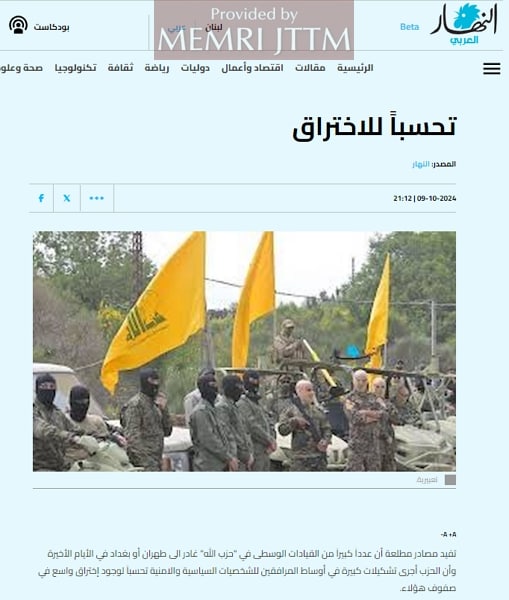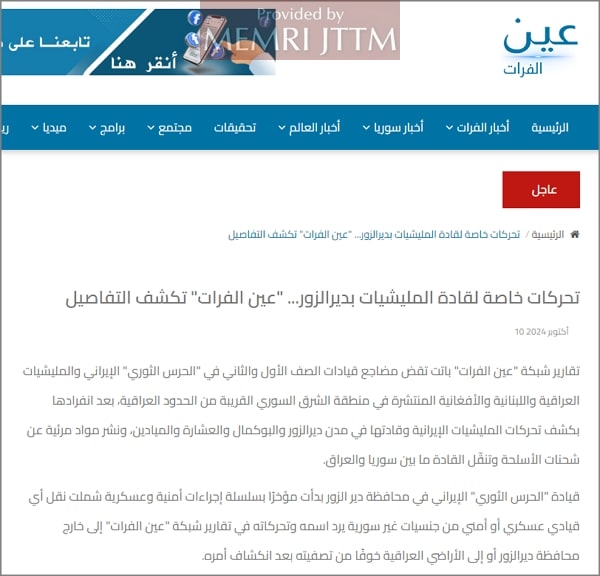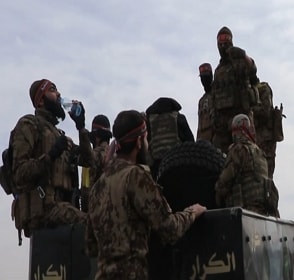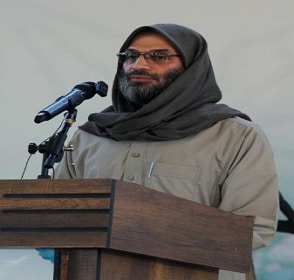The following report is now a complimentary offering from MEMRI's Jihad and Terrorism Threat Monitor (JTTM). For JTTM subscription information, click here.
In recent days, there have been several reports in various Arab media outlets claiming that commanders of Iran-backed militias, including the Islamic Revolutionary Guard Corps (IRGC), Lebanese Hizbullah, and Iraqi militias, have relocated from Syria and Lebanon to Iran or Iraq, out of fear of being targeted in Israeli airstrikes.
Lebanese Hizbullah Commanders Left For Tehran, Baghdad
On October 9, 2024, the Lebanese An-Nahar daily published a brief report quoting "informed sources," who claimed that many mid-level Lebanese Hizbullah commanders have left for Tehran or Baghdad in recent days and that the group has conducted "major formations" among those accompanying its senior political and security figures, fearing "widescale penetration" of its ranks.[1]

Non-Syrian Commanders Of Iran-Backed Militias Left Syria's Deir Al-Zour Governorate, Many For Iraq
The Syrian opposition-affiliated Euphrates Eye website claimed on the following day that the Iran-backed militias operating in eastern Syria are worried by its "exclusive revelations" of the movements of first- and second-tier commanders in Iran's IRGC and Iran-backed Iraqi, Lebanese, and Afghan militias operating in the eastern Syrian towns of Deir Al-Zour, Al-Bukamal, Al-'Asharah, and Al-Mayadin, as well as its video documentation of weapons shipments and movement of leaders between Syria and Iraq.[2] According to Euphrates Eye, IRGC leadership in Deir Al-Zour governorate recently ordered that all non-Syrian military and security commanders whose names and movements have been mentioned in Euphrates Eye reports be transferred out of the governorate or into Iraq, fearing their elimination.

Quoting "exclusive sources," Euphrates Eye reported that most first-tier IRGC commanders recently left the towns of Al-Bukamal, Al-Mayadin, and Deir Al-Zour for Iraq following Israel's September 27 targeted killing of Lebanese Hizbullah Secretary-General Hassan Nasrallah[3] and Iranian IRGC Brigadier General Abbas Nilforoushan, and the subsequent killings of senior Hizbullah commanders 'Ali Karaki and Nabil Qaouk, as well as other senior Hizbullah and IRGC operatives.
According to Euphrates Eye, Hajj 'Askar, the IRGC commander in charge of Al-Bukamal, reportedly crossed the border to Al-Qa'im, Iraq, and has taken other security precautions, including traveling exclusively in civilian vehicles, not revealing his movements to his companions, and not keeping a mobile phone. The IRGC security compounds in the towns of Al-Bukamal, Al-Mayadin, and Deir Al-Zour have become "nearly empty" of first-tier commanders, and are being run temporarily by Syrian commanders. Euphrates Eye added that the IRGC has transferred thousands of documents from the security compounds to houses in residential neighborhoods secretly controlled by Iran-backed militias. The militias have also begun nightly patrols between the security compounds to prevent being photographed and have banned operatives from bringing mobile phones into their headquarters, exclusively using landlines for communication.
Many Iraqi Militia Leaders Have Left For Iran, Some Shortly After Or Prior To October 7 Attack
These reports come following an October 7 item in the pro-Hizbullah Lebanese daily Al-Akhbar, quoting a commander in the Iraqi Resistance Coordination Committee (IRCC) – an umbrella group comprising several Iran-backed militias in Iraq – that Nasrallah's killing led several resistance commanders in the country to change their residences or travel to Iran, to avoid being targeted.[4] The anonymous commander added that some Iraqi resistance leaders, such as Al-Nujaba Movement Secretary-General Akram Al-Kaabi, have been residing in Iran since shortly after Hamas' October 7, 2023 "Al-Aqsa Flood" invasion of Israel. Qais Al-Khazali, secretary-general of the Asa'ib Ahl Al-Haq militia, has also moved to Iran according to the commander, as well as several senior members of Iraq's Hizbullah Brigades. According to the IRCC commander, because it is "expected" that the leaders of all Iran-backed Iraqi militias are potential Israeli targets, it is "obvious" that they should take precautions to ensure their safety.

Al-Akhbar also quoted Kazem Al-Fartousi, the spokesman of the Iran-backed Sayyid Al-Shuhada' Brigades, who acknowledged that many militia leaders have been in Iran "for a while," but claimed this precedes the "Al-Aqsa Flood" and that they are in the country "for various missions." Al-Fartousi further insisted that the Iraqi factions are continuing their "defense of Palestine, Lebanon, and Iraq, and will not stray from their jihadi activity."
It should be noted that Al-Khazali, who regularly documents his meetings with various figures at his Baghdad office, has published no photos of meetings since September 25.[5] On October 7, a video speech of his commemorating the first anniversary of "Operation Al-Aqsa Flood" was aired by Iraq's Alahad television network, but there is no indication where it was filmed.[6]
[1] October 9, 2024.
[2] October 10, 2024.
[3] See MEMRI JTTM Report: Lebanese Hizbullah Confirms Killing Of Secretary-General Hassan Nasrallah In Israeli Airstrike In Beirut's Southern Suburbs, Pledges To 'Martyred' Leader To Continue Jihad, Support Palestine, Defend Lebanon, September 28, 2024.
[4] Telegram, October 7, 2024.
[5] Telegram, September 25, 2024.
[6] Telegram, October 7, 2024.
The full text of this post is available to subscribers.
Please login or register to request subscription information from MEMRI






